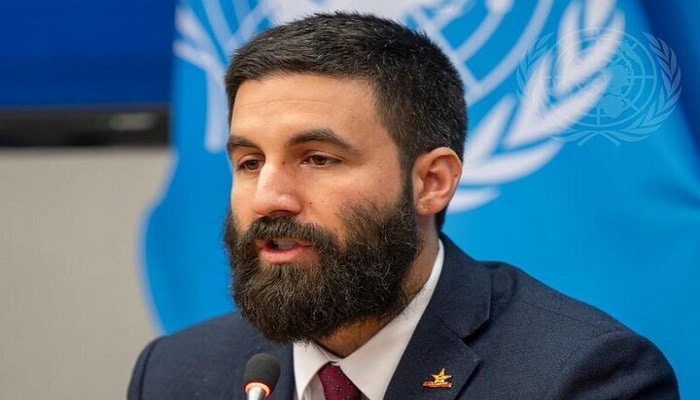PNN – The American analyst says the West has never sought diplomacy, and activating the trigger mechanism will expose the West’s contradictions and accelerate Iran’s trend toward a multipolar world.
The reactivation of the snapback mechanism by European countries that are members of the 2015 nuclear deal (JCPOA) has once again increased tensions between Tehran and the West. The European E3 countries — Britain, France, and Germany — have reinstated lifted sanctions on Iran, citing UN Security Council Resolution 2231, citing “concerns about Iran’s nuclear activities.” However, Tehran has strongly rejected this move, describing it as illegal, political, and a clear violation of the spirit and letter of the agreement.
Iran insists that the move is a unilateral and baseless act with no legal or practical effect. Iranian officials believe that the move reflects the West’s double standards and its unwillingness to engage in real diplomacy, even years after the US withdrew from the JCPOA in 2018.
Amid these rising tensions, Tehran has deepened its cooperation with Moscow and Beijing, emphasizing a long-term shift toward strategic alliances with the East. Iran and Russia recently began implementing their Comprehensive Strategic Cooperation Agreement, marking a new phase of cooperation between the two countries in various areas.
In this context, Mehr News Agency interviewed Christopher Hilali, an American political analyst and Secretary General of the American Communist Party (ACP). He emphasizes that the snapback sanctions expose the West’s contradictions and only accelerate Iran’s rapprochement with Russia and China. According to him, this action marks the end of Western diplomacy with Iran and the beginning of a new strategic era centered on Eastern cooperation and self-reliance.
Read more:
Did Iran lose money by not participating in the Sharm el-Sheikh meeting?
How do you assess the strategic and political impact of activating Snapback on Iran’s international position?
My assessment of the strategic and political impact of the snapback activation on Iran’s international standing is that it shows what many of us have known for years to be true: The West as a whole has had no interest in diplomatic solutions to Iran’s peaceful nuclear program. They have always sought confrontation, maximum pressure, and military action to create the conditions for political regime change in Iran. I have believed for years that Iran’s fate is tied to the East, not the West.
The first strategic impact is that the JCPOA negotiations are effectively over. Although diplomacy continues, the trust and goodwill built over the past decade have waned. Second, the strategic impact is shifting from the diplomatic and political realm to the economic and military realm. The battlefield is both economic, with sanctions, and military, as Iran has just experienced a twelve-day war imposed by the Zionist regime and the United States. Therefore, Iran’s defense capabilities have been increased due to the constant fear of a possible attack.
In your opinion, what impact has the snapback had on Iran’s diplomatic and economic convergence with Russia?
Snapback has helped to transform Iran’s diplomatic and economic convergence with Russia. Both the Russian and Chinese governments have stated in their statements and positions at the United Nations and elsewhere that they do not recognize the reimposition of UN sanctions triggered by European countries using the snapback mechanism. Therefore, Russia will continue to maintain its strategic relations with Iran in all areas. My prediction is that Iran will become closer to Russia in the coming years, both diplomatically and economically, and at the same time, they will confront American hegemony and the unipolar order, and shape a more just multipolar world.
How do you see Russia’s role in mitigating the practical effects of the reinstated sanctions?
In my opinion, Russia will help mitigate the practical effects of sanctions by continuing to trade and cooperate with Iran in a variety of areas. The recent agreement between Iran and Rosatom to build small nuclear power plants worth $25 billion demonstrates Russia’s commitment to expanding and deepening strategic relations with Iran, including in the field of nuclear energy. In my opinion, Russia will also defend Iran at the UN and continue to peacefully and diplomatically resolve the root causes of the issues, including the West’s reluctance to negotiate honestly.
Considering the reaction of other major powers and UN members, how do you assess the effectiveness of Snapback in achieving its goals?
Given that Russia and China do not recognize the snapback, I believe its effect will not be so catastrophic, as the Islamic Republic of Iran has endured decades of US sanctions and maximum pressure. I believe that growing economic ties and integration within BRICS+, the Belt and Road Initiative, and the Shanghai Cooperation Organization (SCO) will enable Iran to overcome the West’s economic warfare and develop its domestic capacities, even without the help of the Europeans and Americans. This demonstrates the resilience of the Islamic Republic of Iran, which some Western analysts and the Israeli Prime Minister claimed would collapse within a few days at the start of the illegal Israeli aggression.
What are possible diplomatic alternatives to reduce tensions and ensure regional stability beyond sanctions and pressure?
The most appropriate diplomatic alternatives to reduce tensions and ensure regional stability are diplomatic solutions that meet the needs of the Iranian people and government and are acceptable to other parties. These solutions must lead to peace, economic prosperity, and development. Finally, a people-centered approach is essential, as sanctions and pressure primarily target ordinary people and the working class. Since diplomatic options with the West are currently out of reach, diplomatic alternatives and agreements will be reached through strategic allies such as Russia and China, intergovernmental organizations such as BRICS+, and from countries of the Global South.

